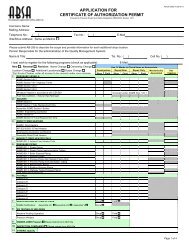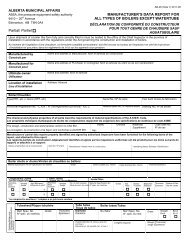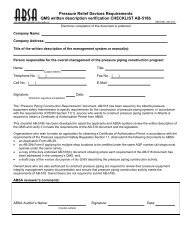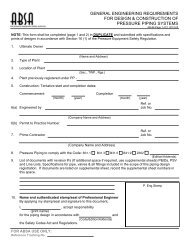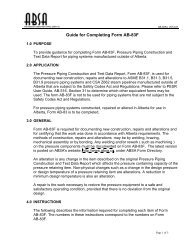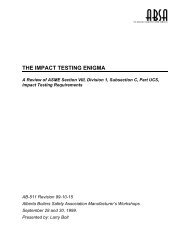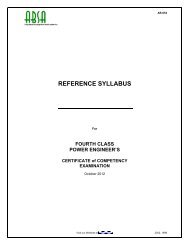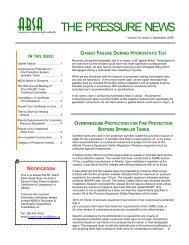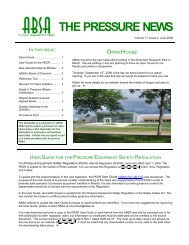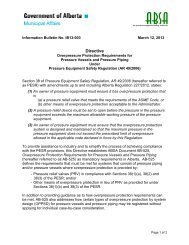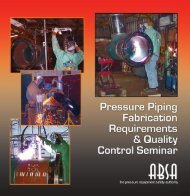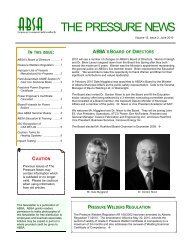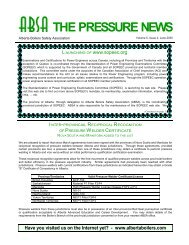The Baker Panel Report - ABSA
The Baker Panel Report - ABSA
The Baker Panel Report - ABSA
Create successful ePaper yourself
Turn your PDF publications into a flip-book with our unique Google optimized e-Paper software.
A. Corporate Safety CultureVI. FINDINGSA positive safety culture is important for good process safety performance. Absent a healthy safety culture, even the best safety managementsystems will be largely ineffective in ensuring and sustaining excellent process safety performance. In 2003, the Conference Board studied bestpractices in corporate safety and health among major corporations, analyzing how leading companies develop safety cultures. While this studyfocused on management and management practices, the Conference Board’s 2003 report indicates that one of the key themes emerging fromthe studywas that management practices alone are not sufficient to achieve outstanding safety performance; all of a company’sworkers must be engaged and involved. Ultimately, achieving excellence is about empowering all workers—management,supervisors, employees, and even contractors—to make safety and health practices truly work. 1<strong>The</strong> report also provides that “[c]ompanies have found that if safety and health values are not consistently (and constantly) shared at all levelsof management and among all employees, any gains that result from declaring safety and health excellence a ‘priority’ are likely to be shortlived.”2Through BP’s investigation of the March 2005 Texas City accident, it appears to the <strong>Panel</strong> that BP has come to appreciate the importance ofcultural factors in promoting good process safety performance. 3 It also appears that BP now understands that a positive safety culture is acritical driver of process safety performance.<strong>The</strong> <strong>Panel</strong> makes five fundamental observations about BP’s corporate safety culture with respect to BP’s U.S. refineries. First, BP has notprovided effective process safety leadership. BP has not adequately established process safety as a core value across all its five U.S. refineries.While BP has an aspirational goal of “no accidents, no harm to people,” BP has not provided effective leadership in making certain itsmanagement and U.S. refining workforce understand what is expected of them regarding process safety performance. BP has emphasizedpersonal safety in recent years and has achieved significant improvement in personal safety performance, but BP did not emphasize processsafety. BP mistakenly interpreted improving personal injury rates as an indication of acceptable process safety performance at itsU.S. refineries. BP’s reliance on this data, combined with an inadequate process safety understanding, created a false sense of confidence thatBP was properly addressing process safety risks. <strong>The</strong> <strong>Panel</strong> further found that process safety leadership appeared to have suffered as a resultof high turnover of refinery plant managers.Second, at some of its U.S. refineries BP has not established a positive, trusting, and open environment with effective lines of communicationbetween management and the workforce, including employee representatives. Creating trust within the organization at all levels is key toestablishing an environment in which safety critical information can be shared among the workforce and with management with confidencethat the information will be used primarily for one purpose—to improve safety conditions and performance.Third, BP has not always ensured that it identified and provided the resources required for strong process safety performance at itsU.S. refineries, including both financial and human resources. Despite having numerous staff at different levels of the organization thatsupport process safety, BP does not have a designated, high-ranking leader for process safety dedicated to its refining business. While the<strong>Panel</strong> did not develop or identify sufficient information to conclude whether BP ever intentionally withheld resources on any safety-relatedassets or projects for budgetary or cost reasons, the <strong>Panel</strong> believes that the company did not always ensure that adequate resources wereeffectively allocated to support or sustain a high level of process safety performance. In addition, BP’s corporate management mandatednumerous company-wide initiatives that apply to the U.S. refineries and that, while well intentioned, have overloaded personnel at BP’sU.S. refineries. This “initiative overload” may have undermined process safety performance. In addition, operations and maintenance personnelin BP’s five U.S. refineries sometimes work high rates of overtime, and this could impact their ability to perform their jobs safely and increaseprocess safety risk.Corporate Safety Culture C 59



